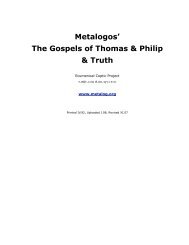Andrew Louth - Syriac Christian Church
Andrew Louth - Syriac Christian Church
Andrew Louth - Syriac Christian Church
You also want an ePaper? Increase the reach of your titles
YUMPU automatically turns print PDFs into web optimized ePapers that Google loves.
212 NOTES<br />
7 By which Maximus seems to mean what was from the beginning and<br />
what will be at the end.<br />
8 This is the subject of the lines in Gregory’s poem that immediately<br />
precede those discussed in this Difficulty.<br />
9 See Luke 16.26.<br />
10 Gregory Nazianzen, Sermon 41.12 [on Holy Pentecost] (PG 36:445).<br />
11 Denys the Areopagite, Divine Names 4.12 (712AB). Note that Maximus<br />
interprets this passage of the Incarnation. In a recent book, Catherine<br />
Osborne has argued—correctly it seems to me—that this is a<br />
misinterpretation of the Areopagite (Osborne [1994], 195–200). It is<br />
interesting that such a Christological interpretation is found so early.<br />
12 ‘Play’, then, seems to take the place in the Evagrian scheme of ascetic<br />
struggle, leading, as it does, to natural contemplation, and finally to<br />
theology.<br />
13 Gregory Nazianzen, Sermon 7.19 [on the death of his brother Caesarius]<br />
(PG 35:777).<br />
DIFFICULTY 1<br />
1 Gregory Nazianzen, Sermon 29.2 (PG 36.76). Also commented on in<br />
Amb. 23 (1257C–1261C), and alluded to in Amb. 10.43, above.<br />
2 In fact, the third.<br />
3 Idem. Sermon 23.8 (PG 35.1160). This could be punctuated to read: ‘The<br />
monad is moved because of its wealth and the dyad is superseded (that<br />
is, [the monad, presumably, passes] beyond matter and form, out of<br />
which bodies are made). The triad is defined on account of its<br />
perfection.’<br />
4 Gregory Nazianzen, Sermon 40.5 [on baptism] (PG 36.364).<br />
5 The temptation to translate enhypostatos (here and elsewhere) as<br />
‘existing in persons’ (or ‘existing as persons’), under the influence of the<br />
once-popular theory of ‘enhypostasia’, should probably be resisted:<br />
enhypostatos is best taken as the opposite of anhypostatos in its basic<br />
meaning of ‘non-existent’ (pace Lampe [1961] s.v. enhypostatos, B.2).<br />
This was argued by B.E.Daley, in relation to Leontius of Byzantium, to<br />
whom, since Loofs, the doctrine of ‘enhypostasia’ has been ascribed, in a<br />
paper at the Ninth International Conference on Patristic Studies (1979),<br />
that has never been published. I am grateful to the author for a copy of<br />
it, which is summarized in Grillmeier (1989), 204–8. Maximus certainly,<br />
however, intends a play on words between the monad as enhypostatos<br />
ontotês homoousiou Triados and the triad as enousios hyparxis<br />
trishypostatou monados (see chapter 4 of the Introduction).<br />
6 Another play on words: the tri-hypostatic triad is monad, because it is<br />
(from the verb that provides ousia, ‘substance or essence’), and the onesubstance<br />
monad is triad, because it subsists (from the verb that<br />
provides hypostasis, ‘person’).<br />
7 ‘Mode’: tropos. There is an allusion here to the Cappadocian Definition<br />
of person (hypostasis) as ‘mode of existence’ (tropos tês hyparxeôs).




